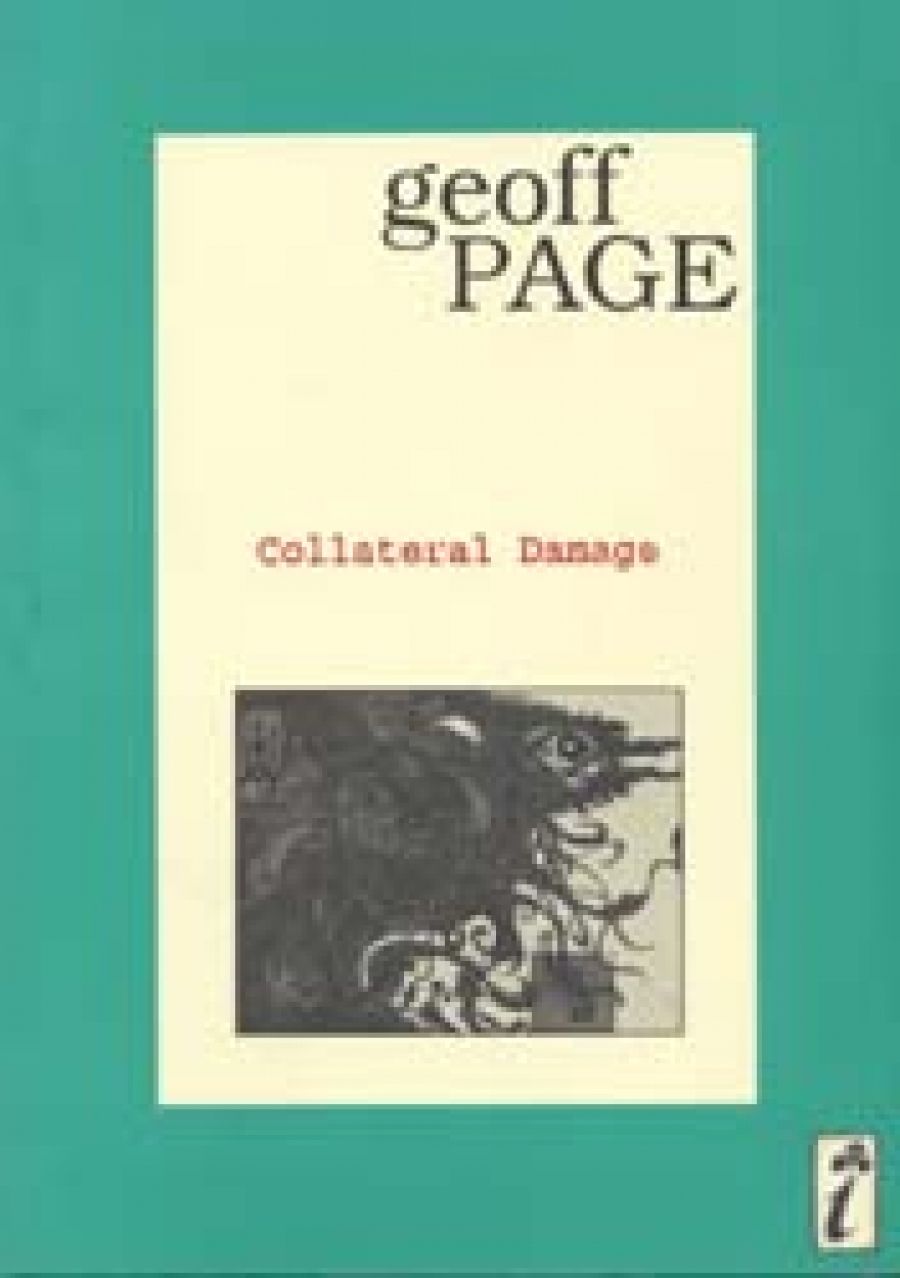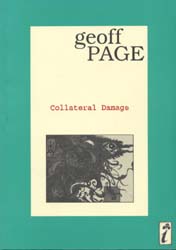
- Free Article: No
- Contents Category: Poetry
- Review Article: Yes
- Article Title: Impressive Volume
- Online Only: No
- Custom Highlight Text:
As with the dozen or so collections of Geoff Page’s poetry that have preceded it over almost thirty years, Collateral Damage can be opened at random with the certainty that something impressive will be there. One of the most striking characteristics of his published work is its consistent high quality.
- Book 1 Title: Collateral Damage
- Book 1 Biblio: Indigo $18 pb, 104 pp
- Book 1 Cover Small (400 x 600):

- Book 1 Cover (800 x 1200):

The teenage weight had somehow lifted
but I had known it long enough
to see what kind of shine or shiverwhat kinds of cloudy meditation
a man with semi-automatic
might suddenly arrive from
It was distressing to come across the poem on the very day when news reports arrived of the awful episode in a Denver school.
The collection’s title poem itself, invoking a euphemism much favoured by war-makers in Kosovo and elsewhere, is one of several reflecting with compassion and empathy on drug addiction and its contributing causes:
Collateral damage, generals say …
that summer when her parents split
and somehow she got lost between themunwanted by the new recruits
bringing in their own
There is a subdued but unmistakable anger here, as also in ‘The Story’ and ‘The Clinic’, each speaking of the often fatal consequences as well as some of the influences leading to addiction.
Among other social injustice and human rights issues raised in this collection are unemployment (in ‘Severance’), gambling (in ‘Icon’) and the devastation of the environment, sometimes associated with the killing or maltreatment of indigenous peoples (in ‘Brazilian Shoes’, ‘North and South’ and ‘A Walk in Guangzhou’).
In several of the poems, Geoff Page returns to his familiar preoccupation with death and ageing, at times tempering the more sombre aspects of the subject with his own kind of gentle wit and irony.
In ‘Obituaries’, musing on those eulogies-in-waiting that constitute what newspaper people call ‘the morgue’, he notes among other things, that ‘for poets it’s the last review/and always comes in late’. His variations on the theme include approaching death (‘Remembering the Names’), death luckily avoided in a skidding car (‘The Correction’), violently inflicted deaths (‘World News’) and, in ‘Timor Mortis’, a mother’s curious attempt to modify her offspring’s fear of death: ‘We’re heart attacks / all down one side / and cancer down the other’.
Another of his ‘occasional’ poems, ‘A perfect day in mid-July …’ recalling the tragic death of a young girl watching the demolition of the old Canberra Hospital, is almost unbearably poignant. It exemplifies Geoff Page’s skill in observing events great and small and making them the subject of poetry.
In nostalgic mode; as in ‘Footwork 2’, ‘Fruit Girl’, ‘The Waltz’, ‘Bildungsroman’, ‘Quick and the Dead’ and ‘The Paris End of ‘62’, Page once more has recourse to his understated brand of humour:
Eighteen months
you’re out of nappies;eighty five
you’re in again –though some achieve
a drier death …So much of what
the Good God givesfalls so far short
of His perfection.
This sometimes hesitant and mildly stated religious agnosticism emerges again, as it has in previous collections, in several other poems: ‘The Shy God’ (‘The more they shout / into the sky / the more he disappears’); ‘The Fundamentalists in Heaven’; ‘The Temperature of Heaven’; and ‘Agnostic Hymn’:
those distant hymns are with me still
caught in snatches from the air
or dropping tinselled from a ceilingas if despite astronomers
and all the layered stones of Darwin
there still might be a god out thereand someone who was once his son
born amid a rush of angels
and unastonished cattle.
In another context, in ‘The Pool’, Page quotes what his mentor William Carlos Williams, echoing Descartes, said of religion: ‘They have imagined it / therefore it is so’.
In Collateral Damage Geoff Page displays the full range of his poetic powers, mostly in three-line stanzas, using but not over-using rhyme and revealing again the breadth of his interests. Now in his late fifties, Page has well earned his high ranking among contemporary Australian poets.


Comments powered by CComment